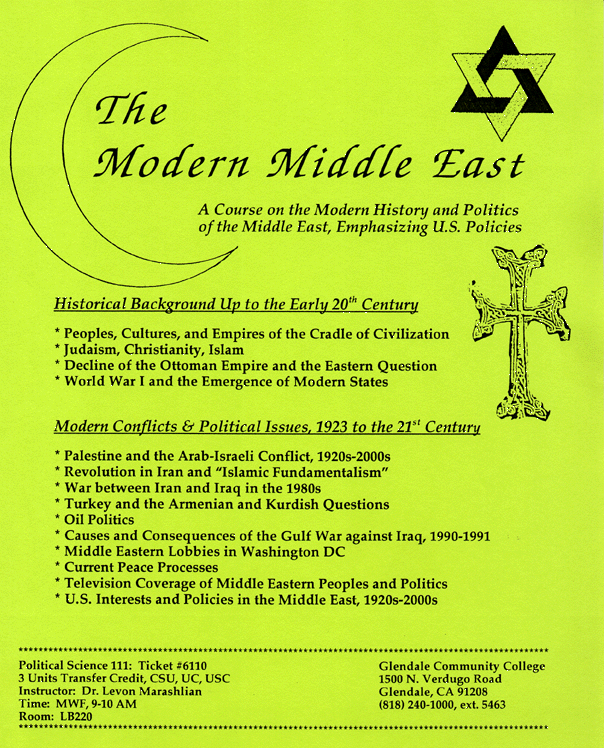

GLENDALE COMMUNITY COLLEGE
Political Science 111:
The Modern Middle East
Instructor, Dr. Levon Marashlian
Office: SR 354 (818) 240-1000, ext. 5463
Hours: MWF, 8:15-9:30 TTh, 9:45-10:15
E-mail: levonm@glendale.edu
I. Rationale
This course is a survey of the modern history and current politics of the Middle East. Because the forces and issues shaping events today involving the Arab states, Israel, Iran, Turkey, Kurds, Armenians, and US policies have deep historical roots, considerable attention will be devoted to the World War I era and the settlement of the Eastern Question. The emphasis, however, will be on major events in recent years and current developments surrounding the Arab-Israeli conflict, the latest signs of changes in Iran, the aftermath of the Gulf War, and other regional issues.
II. Prerequisites
Recommended preparation: Eligibility for English 120 or ESL 151.
III. Course Objectives Include:
1. Understanding the background of the land, peoples, cultures, and religions of the Middle East.
2. Understanding the historical developments that have led to the emergence of the modern nation-states of the Middle East.
3. Understanding the historical roots of ongoing issues and the current developments that are shaping those major issues.
4. Understanding the importance of Middle Eastern oil to the US economy and to international relations.
5. Understanding the strategic interests and diplomatic role of the United States and the domestic factors that shape US policies toward the Middle East.
IV. Course Materials
* Textbook: William Spencer, The Middle East, Global Studies Series, 6th ed., Guilford, Connecticut, 1996.
* Videotapes: Hours of video material selected by the instructor, on political topics and television news coverage of current issues, will be viewed in class.
* Instructor handouts, recommended readings from the current press.
V. Attendance
Students are expected to attend all class meetings. Having more than 3 absences, unless cleared by the instructor, can lead to a lower grade. If a student wishes to withdraw from the class, it is the student’s responsibility to notify the Office of Admissions and Records before the deadline. Failure to do so may lead to a failing grade.
VI. Exams and Grades
There will be two one-hour exams and a two-and-a-half hour final exam. All exams are worth a maximum of 100 points. No grades can be dropped. The final grade will be an average of the three exam grades, according to the following percentage scale:
90 to 100 = A 80 to 89 = B 60 to 79 = C 50 to 59 = D 0 to 49 = F
VII. Exam Make-Up Policy
Make-up exams are allowed only if the instructor is convinced there was a good reason to miss the regularly scheduled exam.
VIII. Academic Dishonesty Policy
All students are expected to do their own work. All forms of cheating and plagiarism are absolutely forbidden. This is the official policy of Glendale Community College and the instructor of this course. Students found to be using unauthorized materials on exams, copying from other students’ exams, copying other written material without proper credit to the original author, or cheating in any other way, will have the particular assignment marked F and may receive a failing grade for the course.
IX. Special Interactive Video Format of the Course
The format of the course features an innovative combination of lecture/discussion and interactive video. Hours of specially edited videotapes on historical topics and current news coverage will be viewed in class to supplement the material in the textbook. Students will be encouraged to follow news coverage of current event issues related to the of Middle East and they will be a required to use a balanced combination of four sources of information when writing their exams:
* Reading assignments in the textbook.
* Classroom lectures and discussions.
* Documentary films and other video material presented during lectures.
* News coverage in the press and on television.
X. Course Outline
A. Brief Introduction:
1. Land and peoples of the Cradle of Civilization.
2. Ancient empires.
3. Judaism, Christianity, and Islam.
B. Modern History:
1. The Ottoman Empire, European imperialism, and the Eastern Question.
2. Pan-Ottomanism and Pan-Islamism.
3. Arab, Turkish, Armenian, and Kurdish nationalism.
4. Zionism.
5. The Young Turk Revolution, 1908.
6. World War I and the Middle East, 1914-1918.
7. The Armenian Genocide, 1915.
8. The Sykes-Picot Agreement, 1916; the Balfour Declaration, 1917.
9. The Paris Peace Conference, 1919.
10. The Treaty of Sevres, 1920; the Treaty of Lausanne, 1923.
11. The mandate system: Palestine, Jordan, Syria, Lebanon, Iraq.
12. Political developments from 1923 to 1947.
C. Recent Developments and Current Events Involving Regional Politics and International Relations:
1. Political survey of Iran, Iraq, Egypt, Israel, Jordan, Lebanon, Syria, Saudi Arabia.
2. The Arab-Israeli Conflict since the UN partition, 1947.
3. The first Arab-Jewish war and the creation of Israel, 1948.
4. The Palestinian struggle for self-determination.
5. Nasser, modern Arab nationalism, and the Suez War, 1956.
6. The Six-Day War, 1967.
7. The October War, 1973.
8. Kissinger, Shuttle Diplomacy and Step-by-Step Peace.
9. Arafat, the PLO, and Black September.
10. Carter, Begin, Sadat and Camp David, 1978.
11. Lebanon: civil war since 1975--internal and external causes.
12. Israel's invasion of Lebanon, 1982.
13. The Reagan Administration's peace initiatives.
14. Iran: Westernization under the Shah and US involvement.
15. Islamic Fundamentalism: resurgence and Ayatolla Khomeini.
16. The Iranian Revolution, 1979-1980.
17. Social and political changes in the Islamic Republic of Iran.
18. The Iran-Iraq War.
19. Turkey, NATO, and the Armenian Question.
20. The military coup in Ankara, 1980; Turkey again the Sick Man?
21. The Kurdish Question in Turkey, Iraq, and Iran.
22. The Armenian Question in the context of current Middle East politics.
23. Oil, OPEC, economic development and politics.
24. Terrorism: definitions and root causes.
25. United States interests and policies in the Middle East.
26. American politics and lobbyists for Middle East issues.
27. Desert Shield and Desert Storm, 1990-1991.
28. Recent developments and current events, from 1992 into the 21st Century.
Copyright 2005 Levon Marashlian